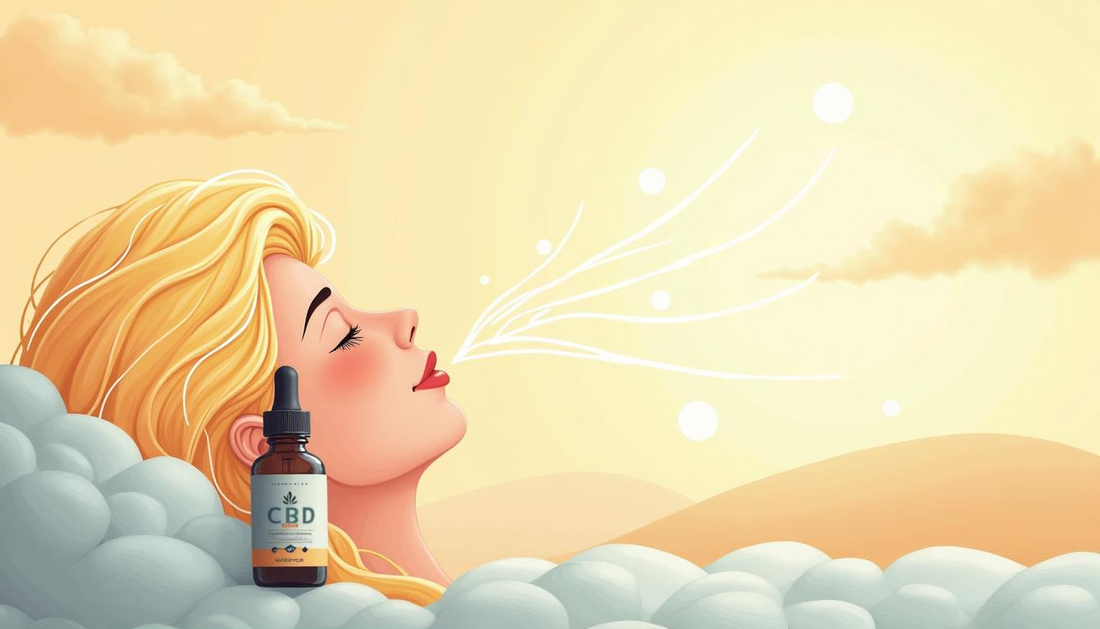
Can CBD reduce sleep apnea?
in the UK, approximately 1.5 million people are affected by sleep apnea. However, this syndrome is not well known, as approximately 8 out of 10 people are not diagnosed. This condition can be quite debilitating for those who suffer from it. After several years of research on CBD, sleep apnea is a condition that cannabidiol can alleviate thanks to its various properties. This article will highlight several important points to help you learn more about the subject. Enjoy reading.
Understanding sleep apnea
Sleep apnea is a condition that disrupts the natural rhythm of those affected. It causes sufferers to stop breathing, often several times, throughout the night. This syndrome has been identified by sleep experts, who have shown that sleep apnea can be dangerous if breathing stops more than five times per hour. It is a much more common syndrome than people think, as in the UK, around 1.5 million people are affected by sleep apnea.
Sleep apnea is generally surprising, even frightening, for those who witness it, and for those who see it in their loved ones. The duration of the cessation of breathing can last ten seconds or more, and sometimes even up to thirty seconds. Imagine being next to someone who's asleep and not breathing for thirty seconds. It's enough to frighten you and make you wonder whether the person is all right. Depending on the individual, sleep apnea can be repeated more than a hundred times in a single night, which seems almost unbelievable.
Sleep apnea is not the same for everyone, and the different levels are distinguished by a variability in the number of breathing stops. A patient with mild apnea will experience between 5 and 15 breath-holds per hour. For moderate sleep apnea, the number of breathing stops is between 16 and 30 per hour. For severe sleep apnea, the number of breathing stops may exceed 30 per hour. In the latter case, medical follow-up is required.
When sleep apnea occurs, the brain is no longer oxygenated, as the apnea causes the respiratory system to stop or decrease. People suffering from this pathology simply end up waking up, as the brain is no longer properly oxygenated, and sends the information to take a new breath. The result is premature waking, then falling asleep again, then waking again, then falling asleep again, and so on and so forth.
People with sleep apnea experience multiple micro-awakenings during the night, and are generally not even aware of it. Unfortunately, they wake up tired on a regular basis, and this has a huge impact on their daily lives.
This makes it very difficult for sufferers to realize they have the condition, or to diagnose themselves, especially if they sleep alone. Sleep apnea eventually leads to a feeling of fatigue throughout the day, forcing people to rest. Sleep apnea can be detected by a number of factors. The first factor has already been mentioned: daytime fatigue. The second is snoring (if the person is prone to snoring during the night). The third factor is daytime sleepiness. If you have more than one of these symptoms, it may be related to sleep apnea.
More about sleep apnea
There are many factors to take into account, and it's vital to be aware of them if you want to eradicate sleep apnea from your nights. To begin with, people who snore loudly, the elderly or the overweight are more likely to be affected by sleep apnea. Mind you, you don't necessarily have sleep apnea if you're elderly or overweight - these are just factors that increase the likelihood.
This short video will help you better understand sleep apnea:
The Cali Weed team would like to thank the Doctissimo website for this interesting short report.
Obstructive sleep apnea
Generally speaking, obstructive sleep apnea is caused by a relaxation of the tongue and muscles inside the throat. The problem is that the lungs are no longer supplied with oxygen. The patient will try to breathe, but will find it almost impossible to do so, forcing him or her to awaken from sleep to take a breath of oxygen. In this particular case, older people are much more prone to this cause, as their muscles lack tone. It should also be noted that overweight or obese people are often victims of this condition. This is due to an accumulation of fat around the muscles of the neck, which reduces the width of the airways.
Central sleep apnea (CSA)
There's another point to describe here, more dangerous this time, but fortunately rarer. This point is directly related to the brain not transmitting the information to the body to wake up and breathe. In these cases, the patient doesn't breathe, because the brain doesn't tell him to. Patients prone to this problem are generally people suffering from so-called serious illnesses, such as Parkinson's disease, meningitis, neurological diseases, heart disease and so on. There are also external factors that can lead to this degree of sleep apnea, such as taking certain medications, smoking or drinking alcohol. Sleep apnea can also occur after a stroke.
For your information, some people can have both types of sleep apnea at the same time: central sleep apnea (CSA) and obstructive sleep apnea (OSA).
Determining the causes of sleep apnea
Life for people suffering from this disease is regularly complicated, especially for those who have had it for a long time. To better understand it, we need to imagine sleeping alternately all night, and then going on for the rest of the day. Fatigue is quickly felt, and it's hard for sleep apnea sufferers to have enough energy to get through the day.
There are a number of problems associated with sleep apnea, known as neurological disorders. Difficulty concentrating, mood and memory problems, and irritability are all very common symptoms of sleep apnea. We link these symptoms to those of insomnia, because they are the same and are caused by a lack of sleep.
A job requiring great vigilance is not recommended for people with this disease, because its functions will be affected and the risk of accidents is increased.
Improve sleep quality with CBD
It has now been proven that cannabidiol or CBD helps you fall asleep more quickly and, above all, improves the quality of your sleep. As CBD plays a role in relaxation and better sleep, it will also help limit sleep apnea attacks during the night.
CB1 and CB2 receptors are located within our endocannabinoid system. CBD will bind to these same receptors, enabling you to sleep much better after stressful moments. Your mind will no longer be fixed on those moments that make life difficult.
To prevent sleep apnea from occurring, taking CBD will block the onset of sleep apnea and improve the quality of your nights. Indirectly, CBD plays a role in sleep apnea! By improving the quality of your nights, sleep apnea will gradually fade away, or in the best case, not occur at all. Stress is also a symptom of sleep apnea caused by lack of sleep. CBD will also bring a feeling of relaxation that will help you fall asleep. Sleep apnea will then occur less and less, and your daily vitality will return within a few weeks of starting your CBD cure.
Combating sleep apnea with CBD
Every new day for someone suffering from sleep apnea can be a complex one. The causes are now known, but so are the repercussions, so that you can pay attention to them during the day. As a reminder, the repercussions will be irritability and mood swings, as well as fatigue that persists throughout the day and a drop in alertness. Be careful, then, as these different symptoms, and fatigue in particular, can increase the risk of daily accidents.
CBD allows users to focus on relaxation and not on stressful issues. People with sleep apnea who use CBD notice an improvement in their overall mood (CBD activates the so-called "happy hormone"). As a result, the days of sleep apnea sufferers who use CBD on a daily basis will improve, and stress-related problems will gradually diminish, leading to a better quality of life.
CBD dosage for good results
In small doses, CBD can give you a boost (like coffee), as it activates adenosine receptors, which play a role in stimulating the body and brain. On the other hand, CBD can be used as a natural soother in higher doses, allowing you to focus on a particular subject. The risks associated with sleep apnea are greatly reduced after taking CBD over a long period of time. If you need help finding the right dosage for CBD and, more specifically, CBD oil, we suggest you read this article: CBD dosage: our tips for the right dosage.
CBD: the entourage effect
Haven't you heard of the entourage effect? To put it simply: inside the cannabis or hemp plant are a hundred different cannabinoids. You're familiar with THC and CBD (of course), but there are also CBN, CBC, CBG, etc., acid forms of these same molecules, terpenes and many other cannabinoids. Taken together, and not in isolation, these molecules are capable of supporting each other and enhancing their effects. That's why we always recommend Full spectrum CBD for maximum benefits. If you'd like to find out more on the subject, take a look at our article: CBD Full Spectrum, Broad Spectrum and Isolate! What's the difference?
Sleep apnea: CBD improves sleep quality
There is a definite improvement in sleep quality thanks to CBD intake. People who take it report sleeping longer and not waking up during the night. This makes for a much more regenerative sleep. Some studies have shown that CBD improves the falling-asleep phase, as well as the duration of sleep and its various cycles.
CBD reduces night-time awakenings
By playing a role in reducing stress, CBD reduces the risk of nightmares and, consequently, the risk of waking up at night. By helping you to calm and relax, CBD will take your mind off negative subjects and put it on positive ones. So go ahead, give CBD a try!
Which CBD to choose?
CBD oil is the first product we recommend and promote. Different percentages (CBD concentrations) and a wide range of flavors are available.CBD oil 20%, for example, is what we recommend if you want to be focused during the day. Conversely, if you want to be soothed and sleep calmly, CBD Calm Evening oil orCBD Sommeil Naturel oil will be just what you're looking for!
The Cali Weed team

